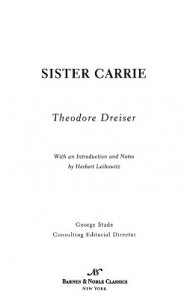Jennie Gerhardt - Драйзер Теодор (книги бесплатно без онлайн .txt) 📗
"Where to?"
"I thought I would go to Cleveland," she replied.
"What for?"
"Why—why—I meant to tell you, Lester, that I didn't think I ought to stay here any longer this way. I didn't think it was right. I thought I'd tell you, but I couldn't. I wrote you a letter."
"A letter," he exclaimed. "What the deuce are you talking about? Where is the letter?"
"There," she said, mechanically pointing to a small centre-table where the letter lay conspicuous on a large book.
"And you were really going to leave me, Jennie, with just a letter?" said Lester, his voice hardening a little as he spoke. "I swear to heaven you are beyond me. What's the point?" He tore open the envelope and looked at the beginning. "Better send Vesta from the room," he suggested.
She obeyed. Then she came back and stood there pale and wide-eyed,
looking at the wall, at the trunks, and at him. Lester read the letter
thoughtfully. He shifted his position once or twice, then dropped the
paper on the floor.
"Well, I'll tell you, Jennie," he said finally, looking at her curiously and wondering just what he was going to say. Here again was his chance to
end this relationship if he wished. He couldn't feel that he did wish it, seeing how peacefully things were running. They had gone so far together
it seemed ridiculous to quit now. He truly loved her—there was no doubt
of that. Still he did not want to marry her—could not very well. She knew that. Her letter said as much. "You have this thing wrong," he went on slowly. "I don't know what comes over you at times, but you don't view the situation right. I've told you before that I can't marry you—not now, anyhow. There are too many big things involved in this, which you don't
know anything about. I love you, you know that. But my family has to be
taken into consideration, and the business. You can't see the difficulties raised on these scores, but I can. Now I don't want you to leave me. I care too much about you. I can't prevent you, of course. You can go if you
want to. But I don't think you ought to want to. You don't really, do you?
Sit down a minute."
Jennie, who had been counting on getting away without being seen, was
now thoroughly nonplussed. To have him begin a quiet argument— a plea
as it were. It hurt her. He, Lester, pleading with her, and she loved him so.
She went over to him, and he took her hand. "Now, listen," he said.
"There's really nothing to be gained by your leaving me at present. Where did you say you were going?"
"To Cleveland," she replied.
"Well, how did you expect to get along?"
"I thought I'd take papa, if he'd come with me—he's alone now—and get something to do, maybe."
"Well, what can you do, Jennie, different from what you ever have done?
You wouldn't expect to be a lady's maid again, would you? Or clerk in a
store?"
"I thought I might get some place as a housekeeper," she suggested. She had been counting up her possibilities, and this was the most promising
idea that had occurred to her.
"No, no," he grumbled, shaking his head. "There's nothing to that. There's nothing in this whole move of yours except a notion. Why, you won't be
any better off morally than you are right now. You can't undo the past. It doesn't make any difference, anyhow. I can't marry you now. I might in
the future, but I can't tell anything about that, and I don't want to promise anything. You're not going to leave me though with my consent, and if
you were going I wouldn't have you dropping back into any such thing as
you're contemplating. I'll make some provision for you. You don't really
want to leave me, do you, Jennie?"
Against Lester's strong personality and vigorous protest Jennie's own
conclusions and decisions went to pieces. Just the pressure of his hand
was enough to upset her. Now she began to cry.
"Don't cry, Jennie," he said. "This thing may work out better than you think. Let it rest for a while. Take off your things. You're not going to leave me any more, are you?"
"No-o-o!" she sobbed.
He took her in his lap. "Let things rest as they are," he went on. "It's a curious world. Things can't be adjusted in a minute. They may work out.
I'm putting up with some things myself that I ordinarily wouldn't stand
for."
He finally saw her restored to comparative calmness, smiling sadly
through her tears.
"Now you put those things away," he said genially, pointing to the trunks.
"Besides, I want you to promise me one thing."
"What's that?" asked Jennie.
"No more concealment of anything, do you hear? No more thinking out
things for yourself, and acting without my knowing anything about it. If
you have anything on your mind, I want you to come out with it. I'm not
going to eat you! Talk to me about whatever is troubling you. I'll help you solve it, or, if I can't, at least there won't be any concealment between us."
"I know, Lester," she said earnestly, looking him straight in the eyes. "I promise I'll never conceal anything any more—truly I won't. I've been
afraid, but I won't be now. You can trust me."
"That sounds like what you ought to be," he replied. "I know you will."
And he let her go.
A few days later, and in consequence of this agreement, the future of
Gerhardt came up for discussion. Jennie had been worrying about him for
several days; now it occurred to her that this was something to talk over with Lester. Accordingly, she explained one night at dinner what had
happened in Cleveland. "I know he is very unhappy there all alone," she said, "and I hate to think of it. I was going to get him if I went back to Cleveland. Now I don't know what to do about it."
"Why don't you send him some money?" he inquired.
"He won't take any more money from me, Lester," she explained. "He thinks I'm not good—not acting right. He doesn't believe I'm married."
"He has pretty good reason, hasn't he?" said Lester calmly.
"I hate to think of him sleeping in a factory. He's so old and lonely."
"What's the matter with the rest of the family in Cleveland? Won't they do anything for him? Where's your brother Bass?"
"I think maybe they don't want him, he's so cross," she said simply.
"I hardly know what to suggest in that case," smiled Lester. "The old gentleman oughtn't to be so fussy."
"I know," she said, "but he's old now, and he has had so much trouble."
Lester ruminated for a while, toying with his fork. "I'll tell you what I've been thinking, Jennie," he said finally. "There's no use living this way any longer, if we're going to stick it out. I've been thinking that we might take a house out in Hyde Park. It's something of a run from the office, but I'm not much for this apartment life. You and Vesta would be better off for a yard. In that case you might bring your father on to live with us. He
couldn't do any harm pottering about; indeed, he might help keep things
straight."
"Oh, that would just suit papa, if he'd come," she replied. "He loves to fix things, and he'd cut the grass and look after the furnace. But he won't
come unless he's sure I'm married."
"I don't know how that could be arranged unless you could show the old gentleman a marriage certificate. He seems to want something that can't




